ECPAT International contributes critical knowledge and evidence to inform advocacy and action against the sexual exploitation of children. Explore our research below.
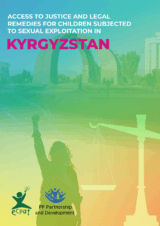
This legal factsheet determines the extent to which Kyrgyz laws provide access to child-centric justice and protection for children who have been subjected to sexual exploitation. It draws on key informant interviews to explore perceptions of the practical realities of children’s access to justice. The findings were presented during a national consultation with stakeholders, who provided feedback and discussed pathways to enhance access to justice and effective remedies for children subjected to sexual exploitation in Kyrgyzstan.
Available in: English
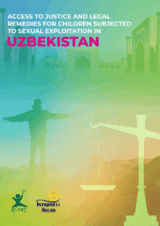
This legal factsheet determines the extent to which Uzbek laws provide access to child-centric justice and protection for children who have been subjected to sexual exploitation. It draws on key informant interviews to explore perceptions of the practical realities of children’s access to justice. The findings were presented during a national consultation with stakeholders, who provided feedback and discussed pathways to enhance access to justice and effective remedies for children subjected to sexual exploitation in Uzbekistan.
Available in: English
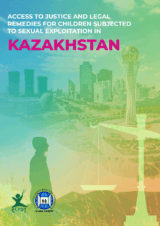
This legal factsheet determines the extent to which Kazakh laws provide access to child-centric justice and protection for children who have been subjected to sexual exploitation. It draws on key informant interviews to explore perceptions of the practical realities of children’s access to justice. The findings were presented during a national consultation with stakeholders, who provided feedback and discussed pathways to enhance access to justice and effective remedies for children subjected to sexual exploitation in Kazakhstan.
Available in: English
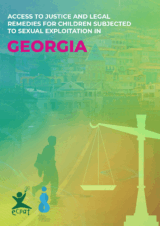
This legal factsheet determines the extent to which Georgian laws provide access to child-centric justice and protection for children who have been subjected to sexual exploitation. It draws on key informant interviews to explore perceptions of the practical realities of children’s access to justice. The findings were presented during a national consultation with stakeholders, who provided feedback and discussed pathways to enhance access to justice and effective remedies for children subjected to sexual exploitation in Georgia.
Available in: English, Georgian
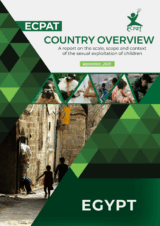
The ECPAT Country Overview on Egypt provides a comprehensive summary of all forms of sexual exploitation of children in the country, assessing achievements and challenges in implementing counteractions to eliminate this issue. It suggests concrete priority actions urgently needed to proactively advance the national fight against sexual exploitation of children.
Available in: English
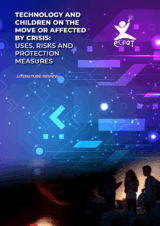
ECPAT International and the Association for the Social Support of Youth have launched a project on the digital safety of children on the move, with a particular focus on Greece and linkages to the Venezuelan migration crisis in Latin America. As a first step, this Literature Review explores:
Available in: English